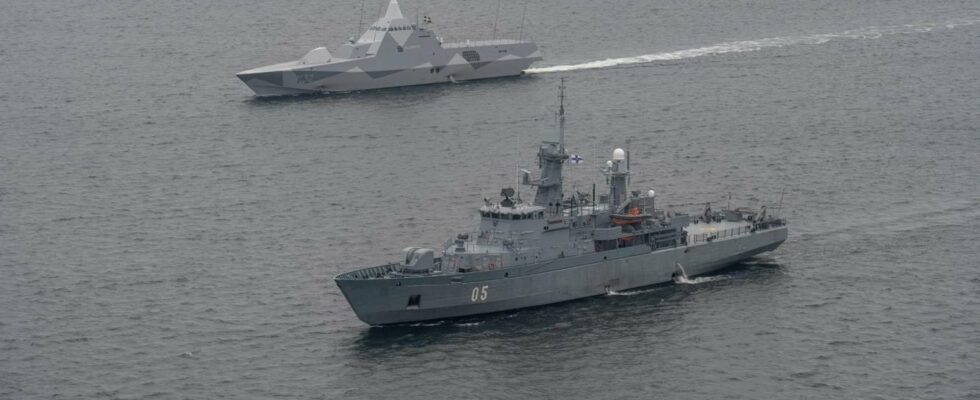“A new act of hybrid warfare”: this is how Finland and Lithuania described Russia’s plan to unilaterally change its maritime borders in the Baltic Sea, for which they demanded explanations. According to the draft decree undertaken by the Russian Ministry of Defense and unveiled on Tuesday May 21, Moscow would like to extend its territorial waters in the Baltic Sea, with the consequence of transferring Finnish and Lithuanian areas to Russian control.
According to the document produced by the Ministry of Defense, Russia’s borders in the western region of Kaliningrad (in red on the map below, illustrated by the American think tank Institute for the Study of War) and in the eastern part of the Gulf of Finland, would be modified.
Shortly after its publication on Tuesday, the draft decree was removed from the government website, which rushed to deny any attempt “to revise its borders”, a military-diplomatic source told the Russian news agency. Tassthe next day.
No intention “to revise our borders”
“There was and we have no intention of revising the perimeter of the territorial waters” and “the economic zone” off “the borders of the Russian Federation in the Baltic,” added this same source. The Russian Defense Ministry also indicated that this modification, which should come into force in January 2025, was necessary because the geographical coordinates established at the end of the 20th century “do not fully correspond to the current geographical situation”.
“Simple” provocation or real political desire? In both cases, the rumor has the effect of increasing tension on one’s neighbors. “If approved, this project would create a sort of gray area […] imagine that a commercial ship enters the maritime zone claimed by Russia and is intercepted by the Russian army, accusing it of violating its borders?” reacted Ryhor Nizhnikau, researcher at the Finnish Institute of Business international, with the Moscow Times. “This creates additional pressure on the governments of neighboring countries, their militaries, as well as the entities that trade there.”
For journalist Ewa Stenberg, from the Swedish daily Dagens NyheterQuoted by International mail, Russia “sends a warning to the Baltic countries members of NATO”, in response to the recent accession of Finland and Sweden to the Atlantic alliance. She wants to show “that she is not giving up on her ambitions to become master of the Baltic Sea”, suggests Ewa Stenberg, who recalls that, at the end of April, the Baltic countries (Estonia, Latvia and Lithuania) had accused Moscow of sowing seeds of confusion by jamming GPS signals over the Baltic.
Furthermore, Estonia accused Russia on Thursday May 24 of having caused “a border incident”, by removing buoys usually serving as physical borders on the Narva River, which separates the two countries. According to the Estonian coast guard, the latter were removed during the night from Wednesday to Thursday by their Russian counterparts.
“This year, Russia said it contested the location of about half of the planned buoys,” the Estonian Coast Guard said in a statement. “At 3 a.m., we saw the Russian coast guard moving buoys,” they add. Estonian Prime Minister Kaja Kallas, for her part, spoke of a “border incident” whose “precise circumstances” have yet to be clarified.
“Hybrid warfare”
Finland, which says it “has no official information on what Russia is planning” reacted this week, accusing Moscow of waging “a hybrid war”, aimed at destabilizing its neighbors. “We must not forget that sowing confusion also means having a hybrid influence. Finland will not allow itself to be disoriented,” said Finnish Foreign Minister Elina Valtonen. “Russia is a member and party to the United Nations Convention on the Law of the Sea. We only expect Russia to respect this convention,” she also wrote.
“The Kremlin has apparently denied it” in the meantime, declared the German Defense Minister, but “be that as it may, it seems to be a new example of the perfidious way in which Putin is waging a hybrid war.” condemned Boris Pistorius, currently visiting Lithuania.
Lithuanian Foreign Minister Gabrielius Landsbergis also denounced the Russian project. “This is an obvious escalation against NATO and the EU, which must be the subject of a firm and appropriate response,” added the minister. President Gitanas Nauseda, for his part, expressed his concerns about Russian plans to allies. According to him, this initiative could be part of a broader action by Russia against NATO.
